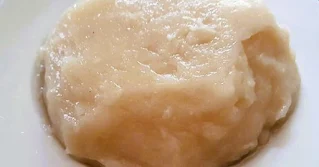Eco-Friendly Dining: Enjoy Angolan Funge Without Utensils
Eat Funge with Your Fingers to Cut Plastic Waste
Funge: Angola’s Classic Side Dish

|
| Funge |
How to Make Funge (Cassava Dough)
- 1¼ cups cassava flour (naturally gluten-free)
- 1 teaspoon sea salt
- 2 cups water
- Bring water to a boil in a large pot.
- In a bowl, mix cassava flour and salt, then whisk into the boiling water.
- Stir continuously with a wooden spoon until smooth.
- Lower the heat, cover, and cook for 15 minutes, stirring until thick and firm.
- Shape small balls to scoop up stews or sauces — no fork or spoon needed!
Since 2007, Chic African Culture and The African Gourmet have shared Africa’s vibrant food stories. Through our Food Charity projects, we promote sustainable eating, empower communities, and preserve culinary traditions.
🍲 Love African flavors and stories? Get fresh recipes and culture tips straight to your inbox.
✉️ Subscribe to The African Gourmet
























